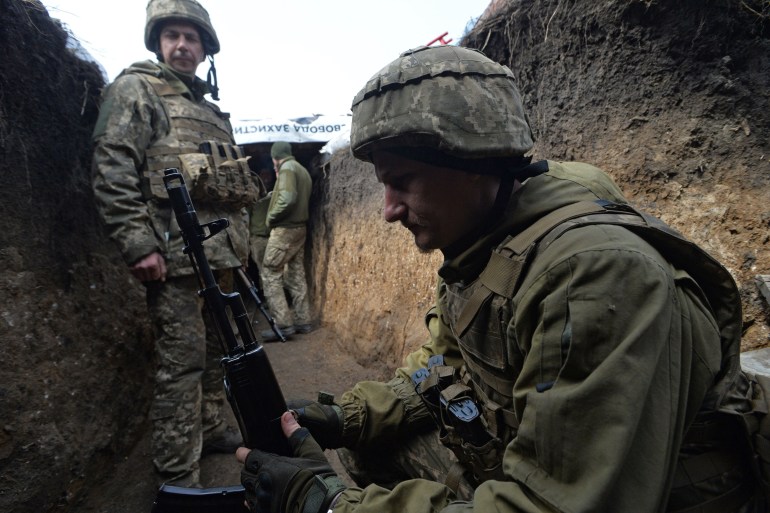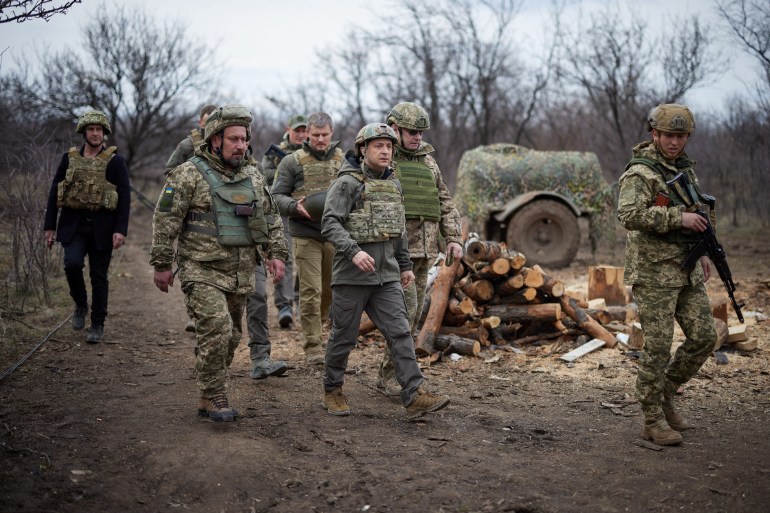Merkel urges Putin to pull troops back from Ukraine border
German Chancellor calls on the Kremlin to unwind military build-up ‘in order to de-escalate’ the situation in Donbas.

German Chancellor Angela Merkel told Russian President Vladimir Putin on Thursday to pull back a military build-up near the country’s border with Ukraine amid heightened tensions in the conflict-stricken Donbas region.
Ukrainian government troops have battled Russian-backed separatists in the country’s eastern Donetsk and Lugansk regions, which form part of Donbas, since the rebels seized a swath of territory there in April 2014.
Keep reading
list of 4 itemsUS asks Russia to explain ‘provocations’ on Ukraine border
Russia to investigate reported killing of child in Ukraine attack
What’s next for the seven-year war in eastern Ukraine?
Fears of an escalation in hostilities have mounted in recent weeks, with Ukraine raising the alarm about an increase in Russian forces along the countries’ shared border and renewed front-line clashes.
“The Chancellor demanded that this build-up be unwound in order to de-escalate the situation,” Germany’s government said in a readout of a telephone call between Merkel and Putin.
The Kremlin, for its part, said in its readout of the phone call that “Vladimir Putin noted provocative actions by Kyiv which is deliberately inflaming the situation along the line of contact”.
Also on Thursday, White House Press Secretary Jen Psaki said the United States was discussing Russian troop movements with its NATO allies.
“Russia now has more troops on the border with Ukraine than at any time since 2014,” Psaki told reporters, referring to the period when Russia annexed the Crimea region of Ukraine.
“Five Ukrainian soldiers have been killed this week alone. These are all deeply concerning signs,” she added.

Zelenskyy visits front line
Meanwhile, Ukrainian President Volodymyr Zelenskyy flew to the front line of the Donbas conflict on Thursday.
Images released by Zelenskyy’s office showed the 43-year-old leader in the trenches clad in a helmet and bulletproof vest, handing out awards to Ukrainian soldiers and shaking their hands.
“Thank you for keeping people calm and defending our land,” Zelenskyy told troops during the trip. “You are a true example of heroism and dedication. We remember every warrior who died defending our state.”
Zelenskyy earlier this week called on NATO to lay out a path for Ukraine to join the military bloc, whose expansion Moscow fiercely opposes, saying it was the only way to end the conflict in Donbas.
He said such a move would act as a “powerful deterrent” to Russia, which annexed Ukraine’s Crimea Peninsula in March 2014 after an uprising that toppled former Kremlin-friendly President Viktor Yanukovych.
Zelenskyy has accused Russia of flexing its military muscles over the latter’s build-up of troops along their shared border.
Russia has previously said its forces pose no threat and were defensive, but that they would stay there as long as Moscow saw fit.
However, Moscow on Tuesday announced it had begun a planned inspection of its army’s combat readiness involving thousands of drills.

Kremlin official warns of ‘end of Ukraine’
Adding to concerns of a potentially imminent large-scale confrontation, a high-ranking Kremlin official on Thursday said Russia could under certain circumstances be forced to defend its citizens in Donbas.
Dmitry Kozak, the deputy head of Russia’s presidential administration, was quoted by Russia’s Tass news agency as saying that Ukraine’s government were like “children playing with matches”.
“I support the assessment that the start of military action – this would be the beginning of the end of Ukraine,” he said.
Moscow has denied interfering in Donbas, but Ukraine and several Western countries have said separatist forces in the region have been armed, led, funded and aided by Russians.
While a ceasefire halted full-scale warfare in the area in 2015, sporadic clashes never ceased.
More than 14,000 people have died in the fighting, according to estimates made by Kyiv.